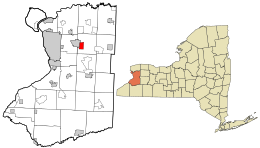Lancaster (village), New York
| Lancaster, New York | |
|---|---|
| Village | |

Lancaster Village Municipal Building
|
|
 Location in Erie County and the state of New York |
|
| Coordinates: 42°54′1″N 78°40′23″W / 42.90028°N 78.67306°WCoordinates: 42°54′1″N 78°40′23″W / 42.90028°N 78.67306°W | |
| Country | United States |
| State | New York |
| County | Erie |
| Town | Lancaster |
| Incorporated | 1849 |
| Government | |
| • Mayor | Paul M. Maute |
| • Trustees | Kenneth L. O'Brien III Edward M. Marki William C. Schroeder |
| Area | |
| • Total | 2.7 sq mi (7.1 km2) |
| • Land | 2.7 sq mi (7.0 km2) |
| • Water | 0.04 sq mi (0.1 km2) |
| Elevation | 673 ft (205 m) |
| Population (2010) | |
| • Total | 10,352 |
| • Density | 3,800/sq mi (1,500/km2) |
| Time zone | Eastern (EST) (UTC-5) |
| • Summer (DST) | EDT (UTC-4) |
| ZIP codes | 14086 |
| Area code(s) | 716 |
| FIPS code | 36-41135 |
| Website | www |
Lancaster is a village in Erie County, New York, United States. As of the 2010 census, the village population was 10,352. It is part of the Buffalo–Niagara Falls Metropolitan Statistical Area.
The village of Lancaster is in the west part of the town of Lancaster and is east of Buffalo.
The Lancaster Opera House is locally famous for its musicals and stage plays. The current mayor is Paul Maute.
The Village of Lancaster was incorporated in 1849 from part of the town of Lancaster. Lancaster is the third oldest incorporated village in Erie County, behind Springville and Gowanda. The village is proud of its historic past and emphasizes preservation of its historic buildings. Lancaster was formerly known as "Cayuga Creek". Lancaster is one of about 30 communities in New York with historic districts.
The oldest house in the village is the Carpenter–Draper House, built in 1831. The Lancaster Presbyterian Church is the second oldest religious structure in Erie County, built in 1832.
Churches in the village include Lancaster Presbyterian Church, St. John's Lutheran, Trinity Episcopal, and Faith United Methodist. Catholic churches include St. Mary of the Assumption and Our Lady of Pompeii.
In 1894 the Lancaster Opera House was built. This building is still the main focus of the downtown Lancaster area because of its massive size and its clock tower. Lancaster Town offices are located in the building. This leads people to call the building both the Opera House and Town Hall.
The Central Avenue/Broadway area is the downtown business area in the village. The former West Main Street was at one time another major business street in the downtown area. However, today very few businesses are located on the street due to its demolition in the early 1970s. In the near future, West Main will be re-extended all the way to the intersection of Aurora, North Aurora, and St. Mary's streets, as it had before the demolition.
...
Wikipedia
